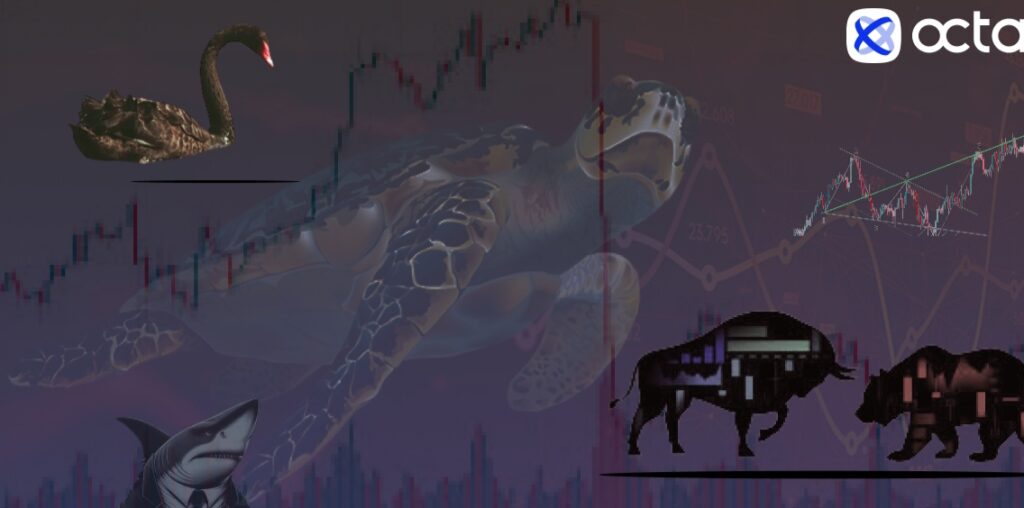
If you’ve seen ‘The Wolf of Wall Street’ with Leonardo DiCaprio as Jordan Belfort, you might have wondered why he’s called a wolf in the movie. It’s not just a random label. Animals are often used in finance to describe traders, their traits, or market conditions.
In this article, Octa broker discusses some of the stock market’s most popular animal slang words and their meanings.
Bulls and bears: the classic dichotomy
Bears and bulls are probably the first creatures that come to mind when thinking about animals in trading. You’ve likely heard about them already or will now notice them everywhere.
Bulls represent rising market trends, and bears—falling trends. According to the origin story, the terms come from how each animal attacks: bulls charge upwards, and bears swipe downwards.
Bull and bear markets are often determined by a 20% move. For example, in late 2018, the S&P 500 almost hit a bear market with a 19.78% drop. It was the pandemic that marked the end of the longest bull market in history. From 2009 to 2020, the S&P 500 saw returns of 400.5% over 135 months as the economy recovered.
These two terms—bull and bear—not only describe the market but also represent investor sentiment. A bull is optimistic, buying stocks at fair prices. However, if prices become too high or negative news emerges, investors turn bearish and start selling to prevent losses or secure profits.
Black swans
Black swans are next on the popularity list, but we’re not talking about people this time. A black swan event is a highly unexpected one that causes a powerful and widespread impact, deviating sharply from what’s usually anticipated. They are extremely rare—like the housing market crash in 2007 – 2008, the Fukushima nuclear accident in 2011, or the COVID-19 pandemic.
The idea of black swan events became well-known thanks to Nassim Nicholas Taleb, a finance expert, author, and former Wall Street trader. In 2007, Taleb talked about these unpredictable and catastrophic events in his book—well before the 2008 financial crisis. He emphasised that market players should be ready for the upcoming downturn, even if it seems unlikely.
Rabbits, turtles, whales, unicorns, sharks, wolves, and others
Bulls, bears, and swans are just scratching the surface. To understand what people are talking about, you should explore other animals in trading.
One group can be described as active and aggressive traders.
- Rabbits. Speedy traders who hop in and out of positions for short-term gains. They’re known for quickly seizing opportunities in fast-paced markets.
- Sharks. Aggressive traders are skilled at exploiting market inefficiencies and profiting from others’ losses with high-risk strategies.
- Wolves. Like sharks, savvy and opportunistic investors observe market movements and exploit emerging opportunities for profit.
Another category is conservative and influential players.
- Turtles. Those who take a slow and steady approach, focusing on long-term growth and prioritising risk management over short-term gains.
- Whales. Big investors or wealthy institutions with plenty of financial resources to move around in markets. Their substantial trades can really shake up asset prices and market feelings because they have so much capital.
- Elephants. Large institutional investors or companies with considerable market capitalisation.
A few others don’t fit into any group and prefer to operate independently.
- Unicorns. Extremely rare startups worth over $1 billion. They’re known for disrupting industries and attracting investment due to their growth potential and innovation.
- Sheep. Those often mimic the crowd’s behaviour.
- Ostriches. They ignore unfavourable market conditions or news related to a particular asset.
- Hawks and doves. Hawks support tighter monetary policy (=higher interest rates), and doves prefer looser monetary policy (=lower interest rates).
If you know your role and which animal represents you, join Octa, a global broker with a wide range of tools to support your trading journey. Here, you can engage in live trading to showcase your style. If you still don’t have one, start with the Octa demo account to define it risk-free.
Conclusion
It’s not necessary to stress over unknown slang words. However, understanding trading slang is significant because it reflects how people talk to each other within trading communities. Even if some terms seem elusive or cryptic, they create a language that unites the target audience even if it initially seems a bit obscure.
Octa is an international broker that has been providing online trading services worldwide since 2011. It offers commission-free access to financial markets and various services already utilised by clients from 180 countries with more than 42 million trading accounts. Free educational webinars, articles, and analytical tools they provide help clients reach their investment goals.
The company is involved in a comprehensive network of charitable and humanitarian initiatives, including the improvement of educational infrastructure and short-notice relief projects supporting local communities.
Octa has also won over 70 awards since its foundation, including the ‘Best Educational Broker 2023’ award from Global Forex Awards and the ‘Best Global Broker Asia 2022’ award from International Business Magazine.










